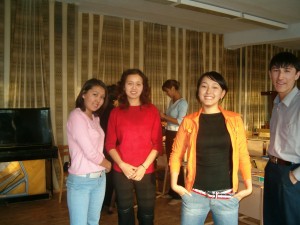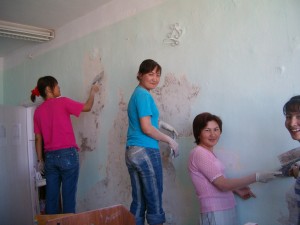We got our official schedules sixteen days after the start of school. I had classes four days each week, rather than the six that most teachers had.
On Mondays, I had a class during first and third periods. My open or empty second period was called an okno (a window). Older teachers would lobby to have no oknos, considered a waste of time. But I looked forward to my oknos; they gave me time to visit with my colleagues, review my class notes, or relax with a cup of tea and a pastry in the small café downstairs.

I grappled with the idiosyncrasies of the larger system for a full year (and write about it here and here). But in those first few months, my challenges within the classroom were an odd mix. The first was a classic cultural difference that rattled that sense of egalitarianism I’d grown up with as an American. I’d never before walked into a room and had everyone in it stand up.
I found it unsettling in the extreme. As though someone had punched me in the stomach.
“I am uncomfortable when you stand up,” I finally told the students in English 49 during our next Friday class together. When they looked surprised, I added, “I feel like you think I’m a queen.”
“You are. You are our teacher,” said Gulsana, who sat in the front row, in the middle section right in front of where I stood.
I accepted that standing showed respect for education and I represented education, but that was not enough to quench my visceral discomfort. My solution finally came, unexpectedly, while trying to solve another problem: getting the weaker students to participate.
| Not all of my students wanted to learn English. A good half of each class contained students who sat in the back rows chatting on their cell phones or searching deep into their compact mirrors for who knows what. I didn’t take it personally; it wasn’t, I believed, a matter of disrespect. I’d see teachers also fall into their compact mirrors at the oddest times. I saw it more as something to do when they had no idea what was going on in the classroom. |
I was determined, in those early weeks, to include everyone, to engage with each student and make each one believe she had a stake in what went on in the classroom. I worked on the assumption that being held accountable, even at the minimal level of needing to pay attention, would help get them invested in the process. And I spent much energy trying to prove me right.
When I walked into the room and the students stood up, I’d hold them all there for a bit. I’d stand quietly, refusing to give the magic words that would let them sit until I had everyone’s attention. I’d smile and nod at individual students whose eyes met mine and stare mutely at those in the back, absorbed in whatever mascara emergency they were facing. But I’d say nothing. My front row students were quick to catch on and they would say something in Kazakh to the others. Eventually, the compacts were snapped shut and the cell phones turned off. Everyone was alert, even if thinking a curious, “What the hell?”
But still I didn’t let them sit.

Instead, I’d smile broadly and give a general “Good morning.”
Following their rote, “Good morning, teacher,” I’d respond. “Is everyone ready to learn?”
Only with that next “Yes,” would I give, finally, the traditional, “You may be seated.”
###
I need a title for this post. Any ideas?
Meeting cultural differences unexpectedly can result in a wide range of reactions. Mine showed up in the pit of my stomach, as though someone had punched me. How about you? Can you think of a time you’ve met face-to-face with a dramatic cultural difference? How did you react?
Next week is our final Deleted Scene in this series from my first few weeks at school.
It’s called Remembering Names. Do you know how you got your name?
Marian Beaman
I vote for maintaining/reinstating Oknos, windows of sanity in the educational milieu. A title for your post? How about THe Perplexity of Postures. . . .
How I got my name? My mother had a friend in church named Marian, a name & person she liked. It was either that or Barbara, she said!
Janet Givens
The Perplexity of Postures. I love the alliteration, Marian. Thanks, as always, for being here. And yes, Up With Oknos shall be my new battle cry.